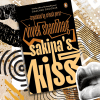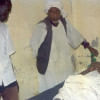Anuk Arudpragasam's 'A Passage North': Requiem for the textures of time, violent and tender

Sand, water, memory—the grainy, elusive grace they share pervades the experiences making up Sri Lankan author Anuk Arudpragasam's second novel, A Passage North (Hamish Hamilton, 2021), shortlisted for this year's Booker Prize. Its project is one of capturing the textures of time remembered and repressed, particularly that of the 26-year-spanning Sri Lankan civil war which robbed hundreds of thousands of civilians of their lives, names, and graves; and it is a project to which Arudpragasam conscripts himself and his narrator as he does his readers.
Krishan, a middle class and liberally educated young man based in Colombo, is plagued by survivor's guilt for having been spared the more extreme manifestations of the war. As life constantly pits him against individuals who are more closely affected than him by violence —his grandmother, struggling against instability of body and mind in old age, his partner Anjum, a fierce activist of caste and gender injustice, and Rani, the Tamil caretaker to his grandmother whose death propels the novel's eponymous journey—Krishan becomes obsessed with virtually experiencing the war through images, video footage, texts, and personal anecdotes.
The news of Rani's sudden death, possibly a suicide, sends Krishan into a Proustian journey inside his own mind, and in the tactile world it sends him northward to Jaffna to attend Rani's funeral. It is here in Sri Lanka's northern regions where the insurgency fought by the Tamil Tigers killed Rani's two young sons, among thousands of others, in a war that erupted along ethnic divides between Sinhalese and Tamils drawn by British colonial forces. But decades since the Tamil Tigers' defeat in 2009, the most painful and unjust legacy of the war remains the state's denial of its war crimes, the families who never got to bury or even find their dead, and the development that masks this national amnesia.

Arudpragasam's debut novel, The Story of A Brief Marriage (2006), thrusts its protagonist into the thick of life in refugee camps during the war. That A Passage North puts us at a remove from it can raise some questions about the politics of his choice of narrator. Why did we need to experience Rani's trauma from the war not through her own retellings, but through Krishan's belated reflections on his interactions with her? Why are we allowed to traverse at leisure through Krishan's own labyrinth of desires and longings?
One answer could be that the novel is actually inclusive of an entire orchestra of voices and pains, that it borders almost on serving as a philosophical treatise—on desire, on yearning, on memory and ageing, coming from an author who studied philosophy at Columbia University. Yet its tone remains deceptively simple and humble. The prose, in fact, gains an almost toppling strength from its sparkling clarity. Its sentences soar and tumble through the thickets of Krishan's mind, and it drags the reader along through entirely unexpected rhythms and territories of thought. It is exhilarating. But it can occasionally be tiring. And, a little more occasionally, too expository.

The author deftly mines through the nuances of the war's legacy here—Krishan, through his Sinhalese background and his circumstances in life, is culturally and socioeconomically more privileged than Rani, who comes from the Tamil region, and he has parallelly suffered fewer losses than her. Even more deftly explored are intricate markings of daily existence. "One could tell by observing the movement of their eyes whether a person spent most of their time feeling shame or self-assuredness or desire or yearning or self-containment, one could tell from the readiness of the smile how vulnerable a person was and from the furrows above the brows how much they were plagued by anger or anxiety", Krishan reflects at one point.
And so, a more significant answer could be this—that in imbibing so much silence and so many layers of distance between the war and the present day audience reading about it, Arudpragasam is showing us that Krishan is us, in our fumbling, confused, guilt-ridden roles as outsiders to an act of violence.
To reach the end of each chapter in this book is to come up for a gulp of fresh air after long laps of a swim, and through the sustained absence of a plot and dialogues and pauses, Anuk Arudpragasam is giving us an exercise in listening to survivors of trauma, which often requires a lot of patience and grace, and he is unpacking the politics, the reckoning demanded by the practicing of empathy.
Sarah Anjum Bari is the editor of Daily Star Books. Reach her at [email protected] or @wordsinteal on Twitter and Instagram.

 For all latest news, follow The Daily Star's Google News channel.
For all latest news, follow The Daily Star's Google News channel. 








Comments